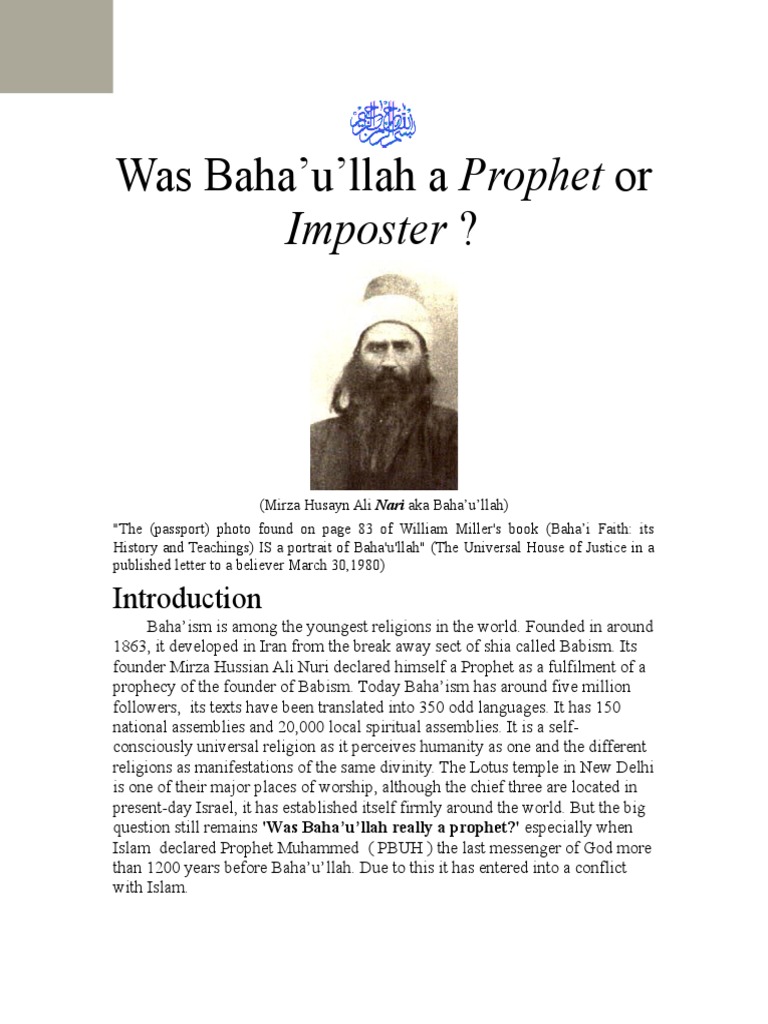The Bahá’í Faith espouses a profound conviction in the continuity of divine revelation, asserting that God intermittently sends Prophets or Manifestations to guide humanity. With this in mind, the hypothetical arrival of a new Prophet presents a plethora of contemplative considerations within the Bahá’í framework. This article endeavors to explore the implications of such an eventuality through various prisms, encapsulating theological, sociocultural, and existential dimensions.
1. Understanding Prophethood in the Bahá’í Context
In Bahá’í doctrine, Prophets are not mere historical figures but embodiments of divine attributes, functioning as mediators between humanity and the ineffable. Each Manifestation brings teachings suited to the needs and capacities of the time, addressing the moral and spiritual exigencies of society. Recognizing this premise is crucial when contemplating the arrival of a new Prophet.
2. Assessing the Nature of New Revelation
Should a new Prophet emerge, it becomes imperative to discern whether their teachings are wholly novel or a reinforcement of existing principles. Bahá’ís believe that divine revelations build upon one another. A new Prophet, therefore, might elucidate previous teachings, enhancing their relevance to contemporary conditions. Consideration must also be given to how such revelations would align with or diverge from the foundational tenets established by Bahá’u’lláh.
3. The Response of the Bahá’í Community
The Bahá’í community is inherently one of unity, emphasizing collective action and shared understanding. In the event of a new Prophet, the community would need to engage in a comprehensive discourse, analyzing the teachings in light of current societal norms, traditions, and the overarching principles of unity and peace. How would believers reconcile the new revelations with the teachings of Bahá’u’lláh? This internal discussion would be vital for fostering coherence within the community and ensuring adherence to fundamental Bahá’í principles.
4. Potential Challenges and Contentions
In grappling with the advent of a new Prophet, obstacles are inevitable. Historical precedents reveal that new revelations often engender controversy. For instance, the emergence of Bahá’u’lláh faced substantial opposition from existing religious authorities and sects. Anticipating resistance from within and outside the Bahá’í community is paramount. How will the new Prophet’s message be authenticated? Will there be skepticism regarding their legitimacy? Such challenges necessitate a robust theological and methodological framework to respond to dissent.
5. Sociocultural Implications of New Teachings
A new Prophet would undoubtedly reflect the cultural, social, and technological circumstances of their era. The implications of contemporary issues—such as environmental concerns, social justice, and global interconnectedness—would likely be central themes in their message. This perspective fosters an environment of relevance for followers, bridging the gap between religious teachings and modern-day dilemmas. The influence of globalization could also be examined, as these teachings might disseminate rapidly through interconnected channels, potentially leading to a renaissance of Bahá’í belief systems globally.
6. Integration of Science and Religion
One of the distinguishing features of the Bahá’í Faith is its commitment to harmonizing science and religion. A new Prophet’s teachings would ideally further this integration, perhaps introducing novel scientific insights that bolster the philosophical underpinnings of faith. The dialogue between empirical observation and spiritual discernment could yield profound insights, reinforcing a cohesive worldview that embraces both realms of human experience.
7. Personal Reflection and Spiritual Development
For individual Bahá’ís, the prospect of a new Prophet serves as an impetus for personal reflection and spiritual maturation. Followers might confront their beliefs more critically, assessing how new teachings resonate with their spiritual adventures. This challenge fosters a deeper connection with the divine, encouraging individuals to embark on a path of introspection, growth, and enlightenment. The process could also catalyze greater engagement with spiritual practices, emphasizing prayer, meditation, and community service.
8. The Role of Interpretation
Interpretation remains a crucial aspect of receiving and understanding new revelations. The Bahá’í Faith promotes the idea of independent investigation of truth; hence, it is vital that followers approach any new teachings through diligent scholarship and open-minded inquiry. The role of elected institutions and learned individuals in guiding interpretation will be indispensable, ensuring that understanding is anchored in affection and wisdom, rather than divisiveness or dogmatism.
9. Conclusion: Embracing Continuous Revelation
The arrival of a new Prophet, while a speculative scenario, provides a fertile ground for reflection within the Bahá’í community. By embracing the concept of continuous revelation, Bahá’ís are equipped to navigate the potential complexities such an event might introduce. Ultimately, the focus remains steadfast on fostering unity, engaging with the evolving nature of divinity, and nurturing the spiritual and moral fabric of society. As the world anticipates the unfolding of future revelations, the Bahá’í Faith stands resilient, advocating for love, peace, and truth as guiding principles in all spiritual pursuits.
